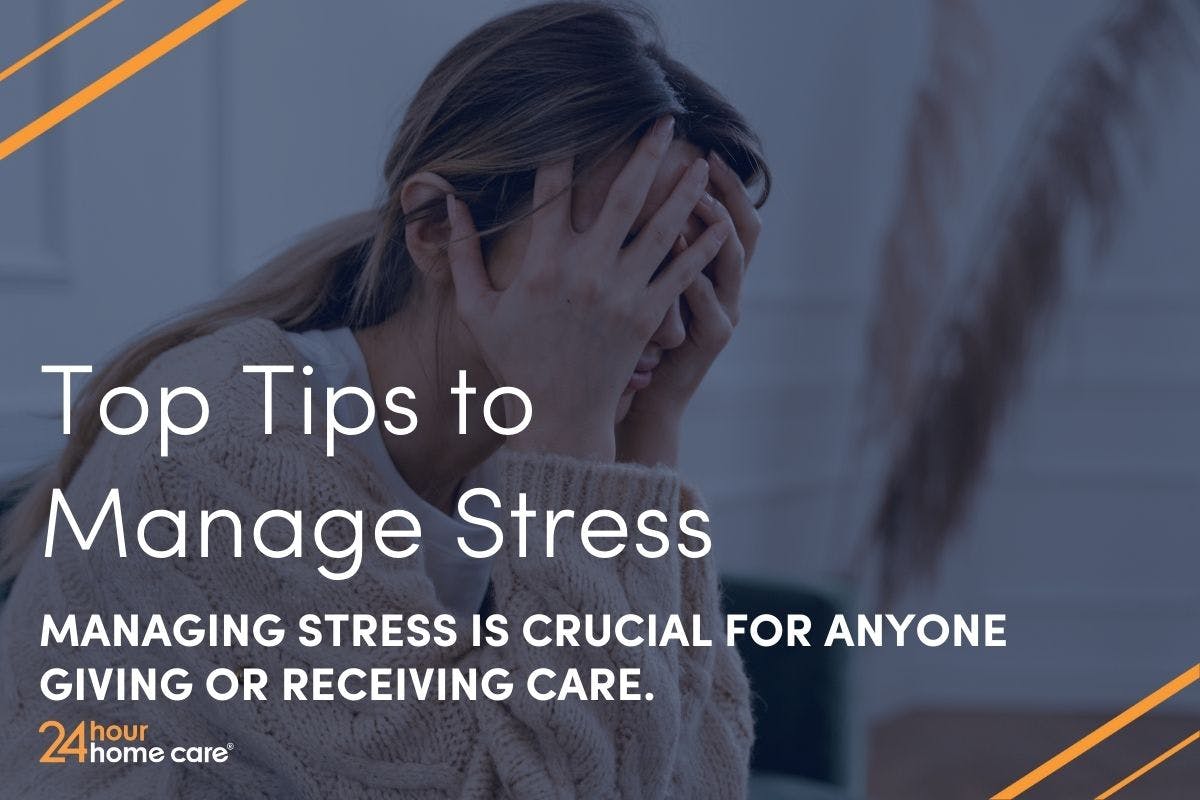Top Tips to Manage Stress
We’re sure you’re already aware of your stress and how it’s impacting your life. Today, we’re sharing our favorite trips and tricks for managing stress levels.

April is National Stress Awareness Month. If you're stressed, we’re sure you’re already aware of your stress and how it’s impacting your life. Today, we’re sharing our favorite trips and tricks for managing stress levels.
Managing stress is so important for anyone giving or receiving care. Being on either side of the table offers its own unique challenges and stressors. Caregivers, too much stress can cause burnout, mental fatigue, and can even have physical effects.
For those receiving care, stress can make healing times longer, exacerbate a pre-existing condition, and lead to overall feelings of being unwell. Stress management is key to living an overall full and fulfilling life.
Top Tips to Mange Stress:

Wrangle Your Stressors – To manage stress, the first place to start is by naming your stressors. Begin by making a list of what is currently adding stress to your life. Next, evaluate the list, is there anything you can drop that will help clear your plate?
If you are unable to drop any of your stressors, see if you can ask for help managing them. You can do this by dropping some of your standards, enlisting a person to help, or letting go of some responsibilities.

Reach out For Help – Reaching out for help can mean a few different things. You could start by reaching out to someone in your social network. A good friend or family member with an open ear and sound advice can help reframe your stress or take some of the emotional load off you.
Asking for help can also mean seeking out a therapist or life coach. They can be an objective third-party that can help to reevaluate your load and provide a neutral sounding board if you want to get anything off your chest.

Focus on Nutrition – Food and nutrition can have a bigger impact on your body and mind than you think. Incorporating healthy foods into your diet can help you feel more energized and focused. Proper nutrition also helps boost your immune system, and helps your organs work as they should.
Some foods that help manage and reduce stress are:
- Fatty fish like salmon, trout, or sardines
- Legumes like beans and lentils
- Different types of berries
- Fruits, such as bananas, apples, pears, oranges, and other citrus fruits
- Leafy greens
If you are experiencing stress, here are some foods to cut out of your diet. These foods can also drain your energy and make you feel tired.:
- Caffeine, if you’re stuck on coffee, try to taper down your caffeine tolerance with tea
- Alcohol, drinking too much can actually lead to more stress
- Artificial sweeteners and other added sugars

Regulate Your Sleep – Stress during the day can keep you from sleeping at night. Not sleeping well can lead to mood swings, fatigue, and overall malaise. If you’re feeling stressed and overwhelmed, one of the best ways to reset is by taking care of your sleep schedule and sleep hygiene.
To start regulating your sleep, put down the phone before bed. Blue light can have a negative effect on your slumber by suppressing the sleep hormone melatonin. The next thing you can do if you’re losing sleep is to move your body throughout the day. This helps expel excess energy and gets your body ready for sleep.

Move Your Body – As we mentioned above, physical activity and movement can help you get to sleep, but it also has other great benefits. When you are stressed, getting exercise can mitigate the effects of stress on the body and mind. Additionally, frequent movement and exercise can help increase brain chemicals that make you happy.

Get Outside – It's been proven that getting outside can do wonders for your health. Spending just 30 minutes outdoors can reduce anxiety, help sleep, increase vitamin D, and help boost your immune system.

Manage Social Media and Scrolling Time – Too many of us spend the night scrolling through various social media apps. This can be more damaging than we think. A constant onslaught of negative news can truly affect the way you think and see the world. When you are stressed, sad, or feeling upset, it’s best to put the phone done and instead read a book, take a walk, or immerse yourself in an art project.
Unmanaged stress can cause major health problems, including mood swings, insomnia, fatigue, and other physical issues. Taking the first step to manage your stress can help set you, and your loved ones, up for success. Click here to learn more about the benefits of self-care and how it can help to relieve some stressors.
